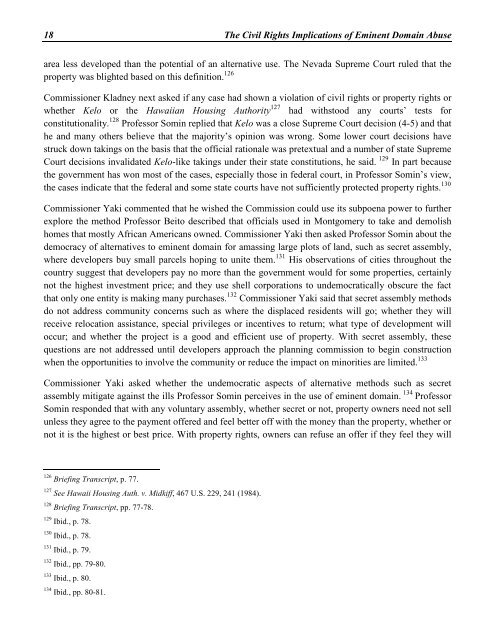Create successful ePaper yourself
Turn your PDF publications into a flip-book with our unique Google optimized e-Paper software.
18 The Civil Rights Implications of <strong>Eminent</strong> <strong>Domain</strong> Abusearea less developed than the potential of an alternative use. The Nevada Supreme Court ruled that theproperty was blighted based on this definition. 126Commissioner Kladney next asked if any case had shown a violation of civil rights or property rights orwhether Kelo or the Hawaiian Housing Authority 127 had withstood any courts’ tests forconstitutionality. 128 Professor Somin replied that Kelo was a close Supreme Court decision (4-5) and thathe and many others believe that the majority’s opinion was wrong. Some lower court decisions havestruck down takings on the basis that the official rationale was pretextual and a number of state SupremeCourt decisions invalidated Kelo-like takings under their state constitutions, he said. 129 In part becausethe government has won most of the cases, especially those in federal court, in Professor Somin’s view,the cases indicate that the federal and some state courts have not sufficiently protected property rights. 130Commissioner Yaki commented that he wished the Commission could use its subpoena power to furtherexplore the method Professor Beito described that officials used in Montgomery to take and demolishhomes that mostly African Americans owned. Commissioner Yaki then asked Professor Somin about thedemocracy of alternatives to eminent domain for amassing large plots of land, such as secret assembly,where developers buy small parcels hoping to unite them. 131 His observations of cities throughout thecountry suggest that developers pay no more than the government would for some properties, certainlynot the highest investment price; and they use shell corporations to undemocratically obscure the factthat only one entity is making many purchases. 132 Commissioner Yaki said that secret assembly methodsdo not address community concerns such as where the displaced residents will go; whether they willreceive relocation assistance, special privileges or incentives to return; what type of development willoccur; and whether the project is a good and efficient use of property. With secret assembly, thesequestions are not addressed until developers approach the planning commission to begin constructionwhen the opportunities to involve the community or reduce the impact on minorities are limited. 133Commissioner Yaki asked whether the undemocratic aspects of alternative methods such as secretassembly mitigate against the ills Professor Somin perceives in the use of eminent domain. 134 ProfessorSomin responded that with any voluntary assembly, whether secret or not, property owners need not sellunless they agree to the payment offered and feel better off with the money than the property, whether ornot it is the highest or best price. With property rights, owners can refuse an offer if they feel they will126 Briefing Transcript, p. 77.127 See Hawaii Housing Auth. v. Midkiff, 467 U.S. 229, 241 (1984).128 Briefing Transcript, pp. 77-78.129 Ibid., p. 78.130 Ibid., p. 78.131 Ibid., p. 79.132 Ibid., pp. 79-80.133 Ibid., p. 80.134 Ibid., pp. 80-81.


